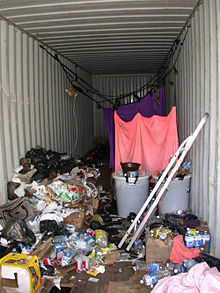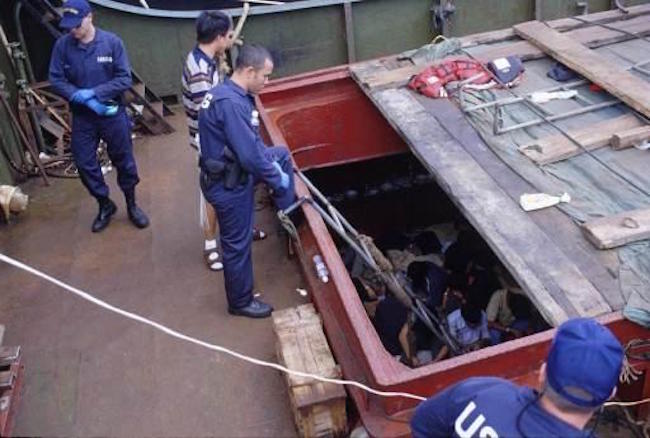Stowaways are people who hide on board a ship without the permission of the shipowner or master. They often do this in order to migrate to another country illegally. Stowaways can be found in a variety of places on a ship, including cargo holds, engine rooms, and even lifeboats.
If a stowaway is discovered, they will be detained by the ship’s crew and handed over to the authorities at the next port of call. Stowaways are usually deported back to their home country, but they may also be charged with a crime.
Stowing away on a ship is a dangerous and illegal activity. Stowaways are often exposed to harsh conditions and they may not have access to food, water, or medical care. They are also at risk of being injured or killed if they are discovered by the crew or if the ship encounters bad weather.
If you are considering stowing away on a ship, I urge you to reconsider. It is not worth the risk. There are legal and safe ways to migrate to another country. Please seek out the help of a qualified immigration lawyer or organization.
The term “stowaway” typically conjures up images of someone hiding in the cargo hold of a ship, hoping to go unnoticed until they reach their destination. But what actually happens to stowaways on ships? Are they immediately thrown overboard?
Do they end up in jail?
It turns out that the answer to this question is a bit more complicated than one might think. While it is certainly against the law to stow away on a ship, the punishment for doing so can vary depending on the circumstances.
In some cases, stowaways may be able to stay on the ship and continue their journey. However, if they are caught, they could face serious consequences.
What happens to stowaways on ships?
If you’re considering stowing away on a ship, be aware that it’s a dangerous proposition. Not only is there the risk of being caught and arrested, but also the very real possibility of death.
According to the International Maritime Organization, around 500 people each year try to stow away on ships.
Of those, an estimated one in four dies during the journey. The rest are either caught by authorities or end up successfully reaching their destination.
So what exactly happens to stowaways?
If they’re lucky, they’ll be found before the ship leaves port and returned to shore. But if they’re not discovered until the vessel is already at sea, things can get much more complicated – and deadly.
If a stowaway is found on board, the captain has several options.
He or she can return to port, but this isn’t always possible depending on the ship’s itinerary and cargo commitments. The captain may also choose to keep the stowaway on board and deliver him or her to authorities at the next port of call.
However, if neither of these options is feasible – for example, if returning to port would cause significant delays or put other passengers at risk – then the captain may have no choice but to disembark the stowaway in a remote location (usually via lifeboat).
This option is obviously extremely risky for both parties involved, and it’s estimated that around 50% of people who are disembarked in this way die before reaching land.

Credit: wikipedia
What is the Fate of Stowaways on Ships
If you’re considering stowing away on a ship, be aware of the risks involved. Stowaways are not allowed on board and if caught, will likely be handed over to the port authorities. From there, they may be detained or deported back to their country of origin.
If you’re caught onboard a ship without proper documentation, you could also face criminal charges.
Are They Thrown Overboard
The quick answer is no, but it’s a bit more complicated than that.
When a ship is sinking, the crew has to abandon ship. They have to get into lifeboats and go to a safe place.
But sometimes the lifeboats aren’t enough and people have to jump overboard.
Jumping overboard is called “casting off” and it’s only done as a last resort. The reason is that it’s very dangerous.
People can easily get hurt or even die if they’re not careful.
So, if there are enough lifeboats and everyone can get to one safely, no one will be cast off. But if the situation is desperate, people may have to jump overboard.
What Do Shipping Companies Do With Them
If you’re wondering what shipping companies do with all those containers, here’s a rundown of the most common uses for them.
Most containers are used to transport goods by sea, but they can also be used to move goods by land or air. Shipping containers come in a variety of sizes, but the most common size is 20 feet long, 8 feet wide and 8 feet tall.
These dimensions were established by the International Organization for Standardization (ISO) in order to allow containers to be stacked on top of each other on ships and in storage facilities.
Containers can be made from a variety of materials, including steel, aluminum and even wood. The type of material used depends on the intended use of the container – for example, steel is better suited for carrying heavy loads, while aluminum is lighter and thus more suitable for transporting delicate items.
Once a container has been used to transport goods from one location to another, it needs to be cleaned before it can be used again. This cleaning process is known as “container washing.” Shipping companies have special facilities where containers are washed with high-pressure hoses and chemicals that remove any dirt, grime or residue that may have built up during transit.
After being washed, the container is inspected to make sure that it meets all safety standards before being released back into service.
Do They Get Sent Back to Their Home Countries
The process of returning migrants to their home countries is called deportation. Deportation occurs when a person is forcibly removed from their country of residence and returned to their country of origin. This can happen for a variety of reasons, including but not limited to: overstaying a visa, committing a crime, or being deemed a security threat.
When someone is deported, they are typically given little notice and have few rights. They may be held in detention centers until they are deported or put on a plane back to their home countries. In some cases, people who are facing deportation may be able to appeal the decision or obtain a waiver that allows them to stay in their country of residence.
Conclusion
Stowaways are people who hide on board a ship in order to get free passage to their destination. While this may seem like a harmless act, it is actually quite dangerous and is considered a federal crime in the United States. Stowaways are not only putting themselves at risk, but they are also putting the crew and other passengers in danger.
If they are discovered, they will likely be removed from the ship and could be fined or even imprisoned.
Related: How to Stowaway on a Cargo Ship

